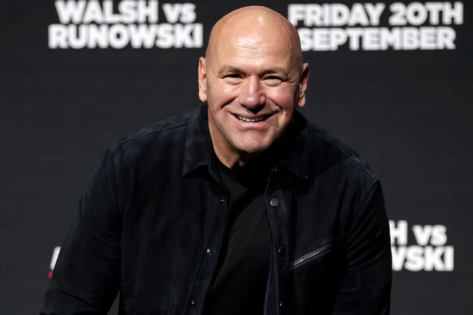Dana White and his boxing venture are gearing up to make a massive statement. In partnership with Riyadh Season, the team will promote a once-in-a-lifetime mega showdown between Canelo Alvarez and Terence Crawford. It’s a bold move for a relatively new promotion, but it doesn’t mean their focus will be limited to just this marquee event, billed as one of the biggest fights in modern boxing history. Interestingly, White has been hinting for months at efforts to change the Muhammad Ali Act, a federal law enacted in 2000 to protect the rights and welfare of professional boxers. Now, it seems he finally holds the leverage to push for reform.
On Wednesday, Congress introduced bipartisan legislation to amend the Professional Boxing Safety Act, marking the first major update to federal boxing laws since the Muhammad Ali Reform Act. But here’s the twist, the bill is being backed by none other than Dana White‘s TKO Group Holdings, the parent company of UFC. This development signals a potentially significant shift in the boxing landscape, with UFC’s influence extending deeper into the regulatory side of the sport. So, what changes could this new bill bring, and what does it mean for the future of boxing?
Just a few hours ago, @aroarboxing shared a post on Instagram with a bold claim: “Boxing will never be the same. This new bill gives TKO Group the power to run their own boxing league!” If you’re wondering what that actually means, it doesn’t replace the original Ali Act of 2000, but expands upon it by creating a parallel structure. Titled the “Muhammad Ali American Boxing Revival Act,” the bill introduces Unified Boxing Organizations (UBOs), allowing new bodies to offer rankings, titles, and matchups, effectively giving TKO Group the authority to build a rival league outside the traditional sanctioning ecosystem of the WBA, WBC, and WBO. But that’s not all.
Co-sponsored by Rep. Brian Jack and Rep. Sharice Davids, and backed by TKO Group, Muhammad Ali’s widow Lonnie Ali, and the Association of Boxing Commissions, the proposed protections and standards set a national minimum payment of $150 per round for all professional boxers. Currently, six states fall below this threshold, while most have no minimums at all. The bill also mandates a national minimum of $25,000 in health coverage for injuries sustained during a bout, exceeding the existing minimums in 43 states.
Moreover, in the UBO system, fighters entering the professional ranks could choose between the traditional model, competing for rankings and titles under the four major sanctioning bodies, or opt for the more streamlined UBO path. He explained that, “The thrust here is we have a system and if you want to stay in that system, you can.”
He clarified that the new act doesn’t alter the Ali Act, but instead adds a new section to U.S. law that allows for the formation of UBOs while amending the Professional Boxing Safety Act (PBSA). With these sweeping reforms, fans could be in for a whole new era of boxing, one shaped by centralized power and entertainment value. However, while it may benefit audiences, many fear it could spell trouble for fighters. So, what role did Dana White play in making this happen?
Can Dana White’s dream league survive the ring?
The biggest challenge posed by Dana White and his company, TKO Holdings, entering the world of boxing is the potential dismantling of the decades-old structures that have defined the sport. While that may not be the stated intention, by sidelining existing sanctioning bodies, White and Turki Alalshikh had been promising a platform where “the best will fight the best,” aiming to reshape how elite matchups are made, bypassing long-standing bureaucracies.
Credits: IMAGO
So what truly sets the TKO boxing league apart from those governed by the four major sanctioning bodies? A key difference lies in its stance on weight classes and world titles. Dana White criticized the current system for having multiple champions in a single division, calling it a “circus act.” He confirmed he won’t collaborate with the existing bodies and instead plans to reduce the number of weight classes, avoiding what he described as “three f—ing weight classes in one.” But beyond structure, it’s the alleged corruption and influence of money, particularly from the Middle East, that are sparking concern about whether this overhaul is a revolution or just a rebranding.
Several voices within the sport have raised alarms, suggesting TKO Holdings may be undermining core principles designed to protect fighters, particularly the safeguards offered by the Muhammad Ali Act. But what do you think? Will this turn into a UFC-style monopoly in disguise? Will legacy sanctioning bodies like the WBC, WBA, and IBF be sidelined? Is this the future of boxing, or the end of everything that made it great?
The post What Is the TKO Backed Muhammad Ali American Boxing Revival Act? Dana White’s Role and More appeared first on EssentiallySports.



